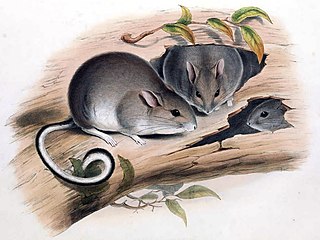
The white-footed rabbit rat is an extinct species of rodent, which was originally found in woodlands from Adelaide to Sydney, but became restricted to south-eastern Australia. It was kitten-sized and was one of Australia's largest native rodents. It was nocturnal and lived among trees. It made nests filled with leaves and possibly grass in the limbs of hollow eucalyptus trees. The mother carried her young attached to her teats. In a letter to John Gould, then Governor of South Australia Sir George Grey said that he removed a baby from a teat of its dead mother. The baby clung tightly to Gould's glove.

The genus Arborimus is a group of voles found in western North America. The genus name is Latin for "tree mouse". Some sources include this genus with the heather voles, genus Phenacomys, and both are classified in the tribe Phenacomyini.

Conocybe apala is a basidiomycete fungus and a member of the genus Conocybe. It is a fairly common fungus, both in North America and Europe, found growing among short green grass. Until recently, the species was also commonly called Conocybe lactea or Conocybe albipes and is colloquially known as the white dunce cap or the milky conecap. Another common synonym, Bolbitius albipes G.H. Otth 1871, places the fungus in the genus Bolbitius.

The white-footed vole is a species of rodent in the family Cricetidae. It is found only in the United States. Its natural habitat is temperate forests.
The Ethiopian white-footed mouse or white-footed stenocephalemys is a species of rodent in the family Muridae. It lives in Ethiopia and Eritrea. Its natural habitats are tropical moist montane forest and tropical high-altitude shrubland.

Technomyrmex albipes, commonly known as the white-footed ant, is a species of ant first described in 1861 from Sulawesi, Indonesia by the British entomologist Frederick Smith. Invasive pest ants in Florida, previously identified as T. albipes, have now been separated as Technomyrmex difficilis, both forming part of a species complex with a worldwide distribution.

Neuroterus albipes is a gall wasp that forms chemically induced leaf galls on oak trees which has both bisexual and agamic generations and therefore forms two distinct galls, the smooth spangle gall and Schenck's gall. Neuroterus laeviusculus and Spathegaster albipes are previous binomials found in the literature.

Cerobasis guestfalica is a species of Psocoptera belonging to the family Trogiidae. It is widespread in the world.
Cerobasis rosae is a species of Psocoptera from the Trogiidae family that is endemic to Canary Islands.
Cerobasis pineticola is a species of Psocoptera from the Trogiidae family that is endemic to Canary Islands.
Cerobasis nigra is a species of Psocoptera from the Trogiidae family that is endemic to Madeira.
Cerobasis rosae is a species of Psocoptera from the Trogiidae family that is endemic to Madeira.
Cerobasis longicornis is a species of Psocoptera from the Trogiidae family that is endemic to the Canary Islands.
Cerobasis insularis is a species of Psocoptera from the Trogiidae family that is endemic to the Canary Islands.
Cerobasis harteni is a species of Psocoptera from the Trogiidae family that can be found in the Azores and North Africa.
Cerobasis amorosa is a species of Psocoptera from the Trogiidae family that is endemic to Cyprus.
Cerobasis ericacea is a species of Psocoptera from the Trogiidae family that is endemic to Canary Islands.
Cerobasis denticulata is a species of Psocoptera from the Trogiidae family that is endemic to the Canary Islands.
Cerobasis canariensis is a species of Psocoptera from the Trogiidae family that can be found on Canary Islands and in Germany.
Cerobasis annulata is a species of Psocoptera from Trogiidae family that can be found in Austria, Azores, Belgium, Cyprus, France, Germany, Great Britain, Greece, Italy, Luxembourg, Madeira, Norway, Poland, Portugal, Switzerland, and the Netherlands.






